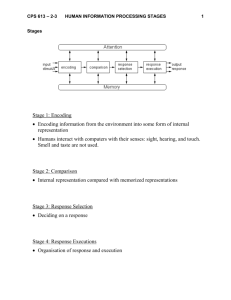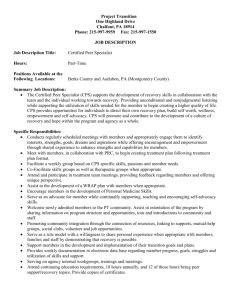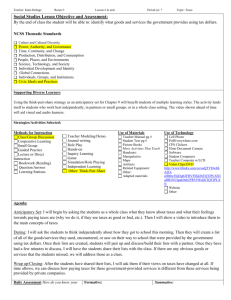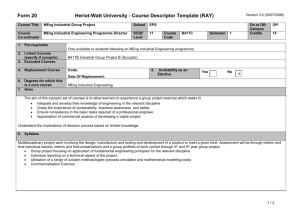View the full course specification
advertisement
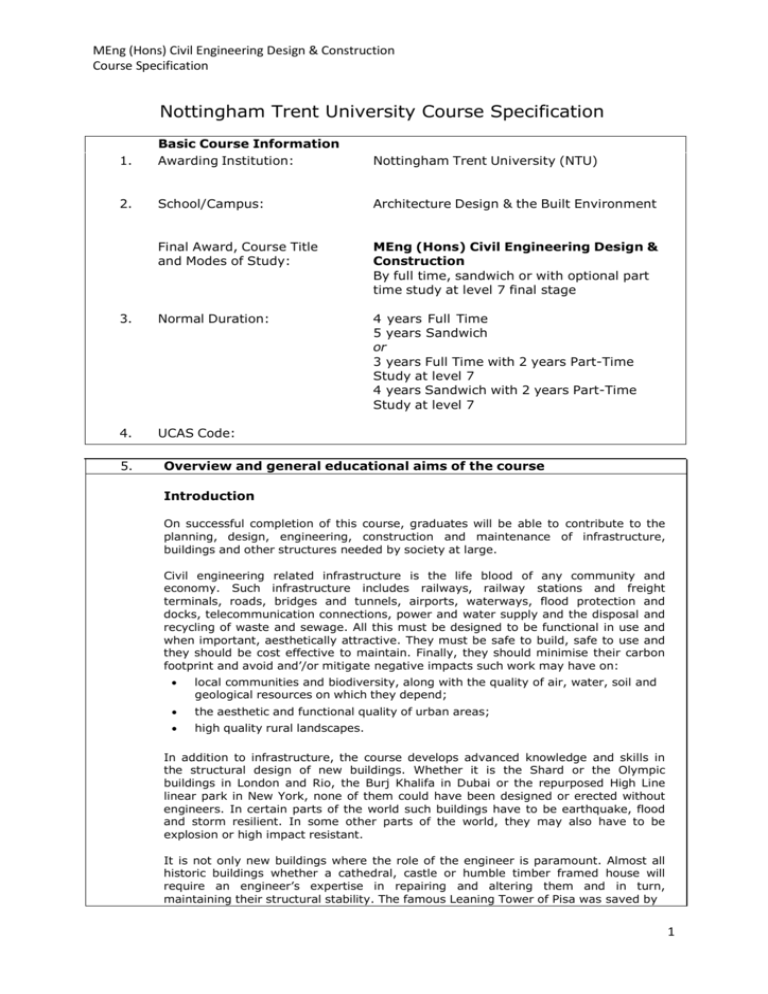
MEng (Hons) Civil Engineering Design & Construction Course Specification Nottingham Trent University Course Specification 1. Basic Course Information Awarding Institution: Nottingham Trent University (NTU) 2. School/Campus: Architecture Design & the Built Environment Final Award, Course Title and Modes of Study: MEng (Hons) Civil Engineering Design & Construction By full time, sandwich or with optional part time study at level 7 final stage 3. Normal Duration: 4 years Full Time 5 years Sandwich or 3 years Full Time with 2 years Part-Time Study at level 7 4 years Sandwich with 2 years Part-Time Study at level 7 4. UCAS Code: 5. Overview and general educational aims of the course Introduction On successful completion of this course, graduates will be able to contribute to the planning, design, engineering, construction and maintenance of infrastructure, buildings and other structures needed by society at large. Civil engineering related infrastructure is the life blood of any community and economy. Such infrastructure includes railways, railway stations and freight terminals, roads, bridges and tunnels, airports, waterways, flood protection and docks, telecommunication connections, power and water supply and the disposal and recycling of waste and sewage. All this must be designed to be functional in use and when important, aesthetically attractive. They must be safe to build, safe to use and they should be cost effective to maintain. Finally, they should minimise their carbon footprint and avoid and’/or mitigate negative impacts such work may have on: • local communities and biodiversity, along with the quality of air, water, soil and geological resources on which they depend; • the aesthetic and functional quality of urban areas; • high quality rural landscapes. In addition to infrastructure, the course develops advanced knowledge and skills in the structural design of new buildings. Whether it is the Shard or the Olympic buildings in London and Rio, the Burj Khalifa in Dubai or the repurposed High Line linear park in New York, none of them could have been designed or erected without engineers. In certain parts of the world such buildings have to be earthquake, flood and storm resilient. In some other parts of the world, they may also have to be explosion or high impact resistant. It is not only new buildings where the role of the engineer is paramount. Almost all historic buildings whether a cathedral, castle or humble timber framed house will require an engineer’s expertise in repairing and altering them and in turn, maintaining their structural stability. The famous Leaning Tower of Pisa was saved by 1 MEng (Hons) Civil Engineering Design & Construction Course Specification the art and science but above all, ingenuity of engineers. The word ingenuity is in fact the origin of the word engineer – not engine. All of these areas of professional activity require the need to work effectively with clients, contractors, professionals, other stakeholders and the general public. In working with others, whether they be planners, architects, surveyors, geologists or mechanical engineers, it is crucial for civil engineering graduates to be effective communicators, good team players and potential managers and leaders. Above this however, and true of all work undertaken by a professional engineer, is the ability to work and act ethically, serving before all else, the public good. Given the above, civil engineering offers rewarding and varied career options where graduates can make both a tangible and very positive difference to the world in which we live. Indeed, it has been said that civil engineers through, for example, the supply of clean water, save more lives across the world than medical practitioners. Course character, ethos and structure This Master of Engineering (MEng), provides students with the opportunity to prepare for the exciting and constantly evolving world of civil and structural engineering. An accredited MEng is the most direct route to Chartered Engineer status, through four years of academic study. This can include an additional year-long industrial placement in year three or year four. The placement year has the advantage of potentially counting towards the professional development record required for graduate CEng status. This course is intended to be submitted for accreditation by the Joint Board of Mod erators ( JBM). The JBM act for the Institution of Civil Engineers (ICE), Institution of Structural Engineers (IStructE). Chartered Institute of Highways and Transportation (CIHT) and Institute of Highway Engineers (IHE). The course acknowledges and upholds the philosophy set out in the QAA Subject Benchmark for MEng courses. This ascribes an MEng as being set apart from a BEng by its “deepening of technical understanding, additional emphasis on team/group working, an increase in the use of industrially-relevant applications of engineering analysis, and an enhanced capability for independent learning and work.” Additionally with reference to the UK-SPEC, this MEng has been designed to provide an enhanced preparation for professional practice. Given the challenges of the above, the course has design and project work at its heart. Creativity and innovation are in turn encouraged and nurtured in students to help develop a deep, wide and insightful understanding of civil and structural engineering theories and practices and their economic, social and environmental context. In developing its strong vocational nature, this course offers students following the sandwich route, a salaried, supervised year in industry between the second and third academic years. Exceptionally, this can be taken after year 3 (NQF level 6). Placements can be undertaken in a variety of locations with consultants, contractors, developers, public authorities, charities and private companies. The first and second year (NQF levels 4 and 5) introduce and build the requisite theoretical principles and practice that underpins all civil engineering work. The third academic year (fourth year sandwich route) then provides the opportunity to take part in more complex design, construction and/or a s s e t m a n a g e m e n t projects. I n a d d i t i o n t h e f u r t h e r exploration of the business and professional ethics basis of civil engineering practice is undertaken. The final academic year allows for a high degree of individual responsibility in the direction and content of student work. Congruent with this, students are also expected to work with a team based ethos and commitment as is almost always required in industry, where tasks are undertaken through the deployment of teams 2 MEng (Hons) Civil Engineering Design & Construction Course Specification or partners with contractual relationships and responsibilities. All students that have successfully achieved level 6 studies whether by full time or sandwich studies may complete their level 7 stage studies over two years part-time. More exceptionally students would be permitted to do this over three years. In summary, the course aims to: 7. • equip students with the understanding, skills, attributes and personal qualities required to be valued civil engineers and in doing so have provided the academic basis for graduates to become chartered engineers; • provide a rigorous and advanced course of study that prepares students for a wide range of graduate employment opportunities both within and outside the construction industry; • support and encourage students to achieve and where possible, surpass their expectations through the steady development of individually responsible learning; • engender a commitment to undertake life-long learning and equip students with the ability and skills to pursue further postgraduate study. Course outcomes Course outcomes describe what graduates should know and be able to do by the end of their course if they take advantage of the opportunities for learning provided. These are set out in terms of: • knowledge and understanding and • skills, qualities and attributes These are described in sections 8 and 9 below. 8. Knowledge and understanding All of the outcomes described below as indicated by the initials EB have been informed by the QAA Engineering (2010) Benchmark Statement By the end of the course MEng graduates will be able to: a. Evidence a comprehensive and deep knowledge and, a systematic, insightful understanding of key facts, concepts, theories and practices of the art and science of civil and structural engineering (EB) b. Identify and critically evaluate new and emerging trends in engineering technologies, processes and outcomes (EB) c. Apply advanced mathematical and non-mathematical methods, tools and notations in a competent and skilful manner to analyse and resolve engineering problems and challenges d. Apply engineering principles, including analysis, design and evaluation, to help solve small or large scale and, simple or complex engineering challenges of both a practical or theoretical nature (EB) e. Identify and articulate a strategic and comprehensive rationale for the procurement of the design, construction and use of projects within the built environment f. Relate civil engineering to both the local and the wider global context, having regards to social, environmental and ethical issues with an understanding of the political, legal and cultural context of sustainable development (EB) g. Critically appraise the importance of civil engineering to the commercial and economic market place, as well as its role in supporting a healthy, safe and biodiverse environment(EB) 3 MEng (Hons) Civil Engineering Design & Construction Course Specification h. 9. To discerningly understand the different customs and practices of other disciplines, contracting organisation and client organisations, as well as the general public. Skills, qualities and attributes As for knowledge and understanding, all of the outcomes described below as indicated by the initials EB, have been informed by the QAA Engineering (2010) Benchmark Statement By the end of the course, MEng graduates will be able to: 10. a. Design civil and structural engineering related projects that are fit for purpose, recognising the importance of aesthetics, functionality and client and user needs, as well as possible impacts on wider stakeholders (EB) b. Use insight and creativity to develop both practical and innovative solutions to large scale and /or complex engineering problems (EB) c. Demonstrate industry standard proficiency in the use of key technologies, software, materials, standards and codes of practice related to the civil engineering industry (EB) d. Identify, investigate and critically define a range of project briefs having due regard to: environmental sustainability, cultural context, health, safety and wellbeing and, risk and commercial/viability issues (EB) e. Contribute effectively to the management of the design process and critically evaluate project proposals and solutions (EB) f. Work effectively, both independently and within teams, with intellectual curiosity and rigour, whilst also demonstrating a capacity to lead, manage and support others (EB) g. Prepare advanced level business and technical reports and communicate clearly and effectively in oral, sketched, CAD and written form in a variety of formats, at different levels, with different parties, involved in the design, construction and use of projects. h. Research at an advanced level across a range of tasks and challenges. Teaching and Learning Methods A range of teaching and learning methods are used across the course. The particular methods used for each module will depend upon the key learning outcomes of that module and the type of subject material addressed. Staff/student contact will include: individual and group seminars/tutorials, lectures, laboratory/practical sessions, interdisciplinary design projects, cross year and crosssubject projects, residential field courses, site visits, individual research and research supported by staff within the School and potentially from other Schools/disciplines. A number of the modules, and increasingly so at levels NQF 6 and 7, are project based with the aim of integrating design with aspects of site context and conditions, along with construction technology and materials. This will typically involve both individual and group work that is supplemented by topic based lectures and seminar sessions. Other modules that are designed to convey the core subject discipline material are lecture/seminar focussed and supported by laboratory, computer, studio and field practical sessions to integrate the theory and practice elements. This mix of 4 MEng (Hons) Civil Engineering Design & Construction Course Specification learning and teaching methods leads to a more thorough understanding of the subject and the development of associated practical engineering skills, as well as personal and inter-personal attributes and skills. A variety of survey, analysis and problem solving skills are also developed throughout the course. Teamwork is fundamental to the construction industry and its importance is underlined in the QAA subject benchmark. Modules in all years thus contain teamwork elements and the level NQF 6 and 7 projects require extensive collaborative team activity. The development of independent learning skills will be developed through the course and culminate in the undertaking of a level 6 individual project (dissertation). This involves working on a topic that i s chosen in consultation with the course team who will provide support and guidance throughout the period of study. The University runs an online resource to support teaching and learning, called the Nottingham On-line Web-space or NOW. All modules are represented on NOW, which all staff use to provide supporting material and exercises associated with a module. In summary, the course team’s overall aims are to support and nurture the development of all MEng students as confident and independent learners as well as reflective graduate practitioners. In doing so they should be able to work collaboratively and able to communicate clearly and effectively in a range of styles, in a variety of both site and office-based situations. 10. Assessment Methods Assessment is used to : • • • • aid, facilitate and encourage learning, test learning and understanding evaluate the effectiveness of teaching methods and associated resources monitor and evaluate academic standards It is within this context that a variety of assessment methods are used across the course as appropriate to the particular learning outcomes addressed. These range from design project and laboratory assignments where practical skills have to be demonstrated, through to more formal reports, essays or examinations. Through project work, the course team are able to assess important skills and attributes relevant to the world of work, including technical, numerical and communication skills, the command of relevant software, presentation skills, team working, leadership and time and resource management. This is especially true of level 6 and level 7 project work. As well as formal assessments, the course incorporates formative and diagnostic assessments. These will provide students with more informal encouragement and feedback on their progress which does not count towards end of year formal summative grades. Some assessments may be synoptic or overarching, in that one piece of work may cover the requirements of more than one module. This will be used in particular where the nature of a particular civil engineering challenge is multi-faceted in character, which of course, is true of much work in practice. It should be noted that some tasks/learning on this course may require attendance and engagement as part of the assessment criteria. Whilst the much of the work is undertaken on an individual basis, a number of assignments and projects may be undertaken on a group basis. The course team regard this aspect of learning and the student experience to be of fundamental importance to the personal development of aspiring professional civil engineers. 5 MEng (Hons) Civil Engineering Design & Construction Course Specification 11. Course structure and curriculum The course is studied on a 4 year full-time or 5 year sandwich basis with an opportunity do it over 5 or 6 years by completing the level 7, final stage, on a parttime basis The first two academic years of theory and simulated practice are, on the sandwich route, consolidated by a paid placement of 9 months or more. On the full-time route, students’ progress directly into levels 6 and 7 (final year). In terms of content, the course is designed around the JBM core subjects of • materials • geotechnics and, • structures Supporting modules studied are designed to develop both a general understanding of civil engineering and its broad context. These include modules that address various types of infrastructure and construction practice. The course also includes the study of design, health, safety and well-being and, sustainability as connected threads. These permeate both across and through the curriculum from one level to the next. Finally, the course aims to nurture and develop key skills, attributes and personal qualities which will help students throughout the course, in being competent, curious, creative, ethical and reflective professionals. These in turn are intended to make course graduates highly attractive to employers and/or capable of further study at masters and potentially doctoral level. Two options are available at level 7 in order to either widen or deepen a student’s studies. Year 1 (NQF 4) Year 1 (NQF 4) introduces students to civil engineering through the Civil Engineering Design Projects module. This module is intended to integrate a number of civil engineering disciplines through project work that is supported by lecture and seminar sessions. The module will draw upon core material delivered in the four other modules together with developing knowledge and skills in design, construction technology, sequencing and programming, sustainability, CAD, health & safety and verbal, written and drawing communication skills. The project-based ethos of this module is strongly supported by the Engineering Surveying module that incorporates a week long residential surveying field course where the practical surveying skills required by the construction industry along with teamwork and management skills will be developed. Typically, the year will also include model making exercises to examine design options and to test different structures to the point of destruction. Mathematics as an under-pinning science of all engineering is also developed further and the key materials and their properties used in the construction industry are also introduced and explored. Modules include: Civil Engineering Design Projects Engineering Materials Engineering Mathematics & Mechanics Engineering Surveying Introduction to Structural Analysis & Design Total 40 cps 20 cps 20 cps 20 cps 20 cps 120 cps 6 MEng (Hons) Civil Engineering Design & Construction Course Specification Year 2 (NQF 5) Year 2 (NQF 5) builds upon year 1 studies but with more focus on the traditional civil engineering disciplines of structural analysis and design and will introduce hydraulics, ground engineering and construction practice whilst maintaining an element of project work in the Integration of Engineering Applications module. Again an integrating project week will form part of the year’s challenge. Modules include: Construction Practice & The Environment Ground Engineering Further Engineering Mathematics & Fluid Mechanics Integration of Engineering Applications Structural Analysis, Design & Detailing Total Year 3 Placement Sandwich Professional Practice Route with 20 cps 20 cps 20 cps 20 cps 40 cps 120 cps Diploma or Certificate of Successful completion of the work-based placement period along with passing other related assessment tasks will count towards the sandwich award and lead to the award of a Placement Diploma in Professional Practice. This placement period can also be counted towards the professional development requirements leading to the professional qualification of Chartered Engineer (CEng) status. Working in conjunction with the work placement office, you are assisted in identifying appropriate work placement opportunities which are then secured though a process of application and competitive interview. In order to qualify for the Diploma of Professional Practice and the Sandwich Degree Award you will normally have: • completed at least 36 weeks (minimum requirement) of Professional Practice Placement with an approved organisation, though 48 is considered the School norm; • received a satisfactory report from the employer; and • successfully passed specified points of assessment which will typically include a two-part report (general, detailing the duties undertaken along with an evaluation of the role within the overall organisational context, and technical, exploring a topic encountered during the year), a personal development journal and delivery of a presentation. A Certificate in Professional Practice is also available for the successful completion of shorter periods of placement work experience: a minimum of 10 weeks. It is important to note however, that a Sandwich based MEng award will not be conferred with the shorter period of employment associated with the Certificate in Professional Practice. Year 3 full time/year 4 sandwich subjects (NQF6) This year (NQF 6) explores the professional ethics of the profession and industry generally. It also allows all students to develop an area of personal civil engineering interest through the Individual Project. Further aspects of water, geotechnical and structural engineering are studied as well as a more holistic study of the environment and the challenge of sustainability. Modules include: Further Structural Design Further Geotechnical Engineering & Design Professional Responsibilities & Development in Civil Engineering Infrastructure Engineering 1 Individual with Group Project Total 20 cps 20 cps 20 cps 20 cps 40 cps 120 cps 7 MEng (Hons) Civil Engineering Design & Construction Course Specification Year 4 full time/ Year 5 sandwich year/ Year 5/6/7 part time subjects This year has a core of 80 cps along with 40 cps of options. All of the core modules and at least one of the options are at masters level 7. The most substantial module (40 credits) is project-based and will involve a large and/or otherwise complex challenge, whether that be in terms of scale or facets. The work for this module will be undertaken on both on a group and individual basis. This will enable key personal and interpersonal skills, attributes and qualities to be further developed and establish an esprit de corps for the year. The academic team will choose on an operational basis whether to offer one or a choice of projects and these may be laboratory or field work based or, a mix of the two. These could for example include: the planning, design, engineering and construction of: • • • • • • a component of a mass transit system a new by-pass, a major SuDs and flood protection scheme, the rehabilitation of an historic building and associated landscape setting, a coastal protection scheme a large new building and associated site works. Two additional core modules will be taken alongside the project to support students’ knowledge, understanding and associated skills in relation to the particular project – but also explore wider and different aspects of civil engineering practice. Finally and distinctively, two further option modules will be available from an operational range offered each year. As validated in this document, they include a wide range of both deepening and widening type learning opportunities. Some are offered from within the Civil Engineering Group, others from elsewhere within the School and some from the wider University. The opportunity to ‘mix’ and learn both with and from students of other disciplines, is seen as an important part of the overall educational offer and experience. The selection also offers the opportunity for students to undertake some industry work, volunteering and/or or mentoring experience. Civil engineering students have got a good track record within the School of mentoring earlier level students which also accords with the ICE’s requirement for professional members to support junior colleagues. Modules studied include: Core: • • • Major Design & Construction Project Infrastructure Engineering 2 Strategic & Operational Project Management 40 cps 20 cps 20 cps Options may include: A choice of two level 7, 20 cps modules from the following: • Geospatial Engineering • Geophysical & non-destructive investigation • Advanced Structural Mechanics & Computer Applications • Advanced Mathematics & Numerical Modelling • Digital Design (MArch architecture students) Or one of the above, plus one of the following level 6 modules: • Negotiated Work and/or Volunteering/Mentoring Practice • Integrated Design and Building Information Modelling (with Architectural Technology students) • Construction Procurement & International Studies (with QS students) • Heritage & Conservation Management (with BS students) • Design, Value & Cost (with Architecture students) • Thinking Leading and Managing Strategically (with Business School students) 8 MEng (Hons) Civil Engineering Design & Construction Course Specification • • Total 12. Group Development Project ( with Business School students) Leading Learning Development and Career (with Business School students) 120 cps Note: Available options will be confirmed at the start of each academic session on an operational basis. Admission to the course and transfer from NTUs BSc and BEng Civil Engineering Entry requirements For current information regarding all entry requirements for this course, please see the `Applying’ tab on the course information web page. Support for Learning Induction There is an induction pro gramme at the start of Year 1 as well as fo r students entering directly in to other years (including IT and library use). All students receive a course handbook that provides essential information about the course and the support provided to both learn and engage. At the beginning of each new academic year, returning students will receive a welcome and induction guidance. Practice and research based support The staff teaching on the course are active within their professional and/or research fields and are supported by external practising engineers and other professionals who provide guest lectures and project support. Academic and academic course team support The course leader, assisted by year tutors, oversees all students enrolled on the course. All students are supported on an individual basis as to their academic progress and personal welfare. In normal circumstances, all staff offer an individual point of contact through all weeks of the term and by arrangement during the winter and spring vacations. This can be prearranged or if necessary on an ‘as needs be’ basis. All students are encouraged to make contact for help, advice and guidance though academic, administrative or student union points of contact. University work placement support and A University Employability Team assists all sandwich students in finding securing an industrial placement and provide detailed appropriate health & safety briefings before joining their companies. The Employability Team and an academic member of staff will also closely monitor progress during the industrial placement. This is normally through a visit, a call back day and email and telephone contact as 10 MEng (Hons) Civil Engineering Design & Construction Course Specification necessary. University Library and Learning Resources support The library and other learning resources (equipment/plant/IT/laboratory provision) are continually updated to ensure they are fit for purpose. They also offer lectures and workshops on a range of study and writing skills University Student Support Services The University central Student Support Services offers a range of general, specialist and professional support services for students. 14. Graduate destinations / employability Gaining this award will open up the wide range of career opportunities that exist in civil engineering and related industries. Opportunities for career development exist worldwide with many civil engineering companies working on an international basis. The civil engineering courses at Nottingham Trent University have an enviable graduate recruitment record with graduates working for many of the major UK contractors and consultants. Graduates who choose to work in areas related to the subject discipline studied have excellent prospects for employment or further study. Top companies return year on year to employ both placement students and graduates on very attractive starting salaries. Some graduates choose to venture into other sectors and are equally successful in gaining employment because of the transferable skills gained on their course. The numerical and analytical skills are particularly sought after. Other graduates continue in academia and go on to study for higher degrees. The University’s Careers Service is available to all students, offering both group and individual support and guidance. 15. Course standards, currency and quality ‘Standards’ address the level of achievement made by students in achieving the stated learning outcomes of the course. ‘Currency’ addresses the extent to which the course is up to date in content and meets the needs of the civil engineering discipline. ‘Quality’ addresses the supporting framework for learning and the staff and student experience in achieving the standards required. In addition to those outlined in section 13 above on ‘Support for learning’, the following processes ensure they are met: • Peer observation of teaching, student feedback on all modules and annual staff performance reviews • Student Representatives are m e m be r s of t h e co u r s e c o m mi t t e e w h i c h a l s o monitors student feedback on module delivery. • Written and verbal feedback on all assessed work. • One staff visit to students on industrial placement. • All assessments are moderated (checked for quality) by course team members, as well as the course overall being overseen by External Examiners, who visit the University, meet students, see their work and submit an annual report based on the standards and quality of the course. • The Engineering subject benchmark of the Quality Assurance Agency & UKSPEC have been incorporated into the course’s learning outcomes. • • The School Learning and Teaching Committee. An active civil engineering society (CIVSOC) that organises extra-curricular civil engineering activities and events. The Civil Engineering team has a longstanding and active Industrial Liaison Committee which meets at least twice per year. This group comprises senior civil engineers from the public and private sectors (some of whom are alumni) who provide ideas, feedback and assistance in what we teach, the way we run courses and employment related issues • 11 MEng (Hons) Civil Engineering Design & Construction Course Specification 16. • JBM periodic review. • On-going individual and collective staff development as required by the university and professional bodies: continuing professional development (CPD) – lifelong learning. Assessment regulations This course is generally subject to the University’s Common Assessment Regulations (located in its Academic Standards and Quality Handbook). Students need to obtain 480 credit points (cps) to obtain the Master of Engineering degree award. In doing so students must achieve 120cps at each level. Students who do not obtain 480 credit points, may be eligible for one of the following awards: • • • • Certificate of Higher Education – where 120cps at year 1, NQF 4 are achieved Diploma of Higher Education – where 120cps at year 1, NQF 4 and 120cps at year 2, NQF 5 are achieved Ordinary degree – 120CPs at year 1,NQF 4, 120cps at year 2, NQF 5, and 60 cps at year 3 full-time or 4 sandwich ,NQF 6 Bachelors Honours degree – where at least 120 cps at Level NQF 6 are achieved in addition to 240 credit points at the lower level All level 7 modules will be assessed against a pass mark of 50% with reference to NTU’s level 7 common assessment regulations. The final degree classification is based on an aggregate of level 5 grades -20%, level 6 grades - 30% and final year level 7 grades - 50%. The final awards will be classified as an undergraduate course, with an expected minimum grade of 50% at level 7, which is equivalent to a low pass on the NTU postgraduate grade based descriptors. Thus the final classified awards will be made on the basis of 2.2, 2.1 or 1st. If students exit at level 6, the classification will be based on 20% level 5 and 80% level 6. All interim awards will be judged against the criteria as set out for the approved BEng award. 17. Additional Information Collaborative partner(s): Harbin University of Technology, China Course referenced to nati onal QAA Benchmark Statements: Engineering 2010 Course subject to profess ional accreditation by the JBM: The JBM is the overarching body for the ICE, IStructE, IHE & CIHT Date implemented: June 2014 12
